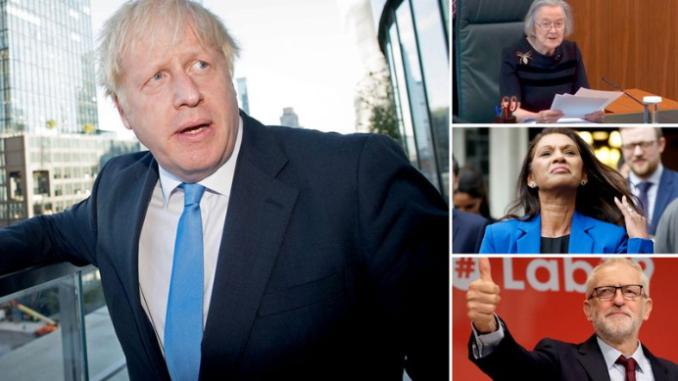
Is Britain being led by political trolls? Anyone looking at the state of the UK political scene these days would be forgiven for asking that question.After being hauled back from New York by order of the Supreme Court, a furious Boris Johnson tore into lawmakers in the House of Commons on Wednesday night for failing to back his Brexit plans or grant him a general election. Even by the vicious standards of British Parliament, the animosity of the clashes was shocking.Johnson goaded and taunted his opponents, denouncing no-deal Brexit legislation as a “surrender act” and accusing lawmakers of wanting to “betray” British voters who wanted to leave the European Union.In one particularly vicious swipe, he dismissed as “humbug” the concerns of an MP, Paula Sherriff, who asked him to recall the politically motivated murder three years ago of a Labour lawmaker, Jo Cox.
“When the trolls are in Parliament, how do we stop feeding the trolls,” asked opposition Labour MP, Stella Creasy, in swiftly scheduled debate on the toxicity of language in the House of Commons on Thursday.Given that the Prime Minister knows how raw the memory of Cox’s murder remains in the Commons, what on earth was he up to? Wes Streeting, a Labour MP, thinks it was planned. “It does feel like there is a deliberate and calculated strategy on behalf of the government to inflame tensions and increase hostility towards MPs,” he told CNN.Sam Gyimah, who left Johnson’s Conservative party recently in protest over his Brexit plans, agrees. “It is deliberate… there is no project at the heart of this government. All it wants to do is leave the EU by any means necessary.”
It’s a strategy that Johnson and his inner circle clearly think is working.
His aides simply don’t believe that the language used by Johnson stokes hatred towards opposition MPs, and they will not apologize for it. Moreover, they believe the language is justified. Johnson himself responded immediately to the “surrender act” criticism, saying the legislation “would oblige us to stay in the EU month after month” and that it would “undermine our ability to properly negotiate in Brussels.”
On paper, this sounds like a measured and calm response. But the word “surrender” has particular connotations, particularly when spat across the Commons chamber. As former Labour leader Ed Miliband pointed out, it implies that the UK is at war with Europe. “But we are not at war with Europe and we are not at war with each other,” he said on Thursday.Ever since the Brexit vote, divisions between those who wish to remain, those who wish to leave with a soft deal and those who want to leave with no deal at all, have become painful. Some MPs, Brexit supporters and some sections of the media have denounced judges, anti-Brexit campaigners and others in even more vicious terms than those employed by the PM on Wednesday.
Johnson may not have been so explicit, but it is worth remembering that he is the Prime Minister of Great Britain and Northern Ireland. As Gyimah told CNN, “Boris Johnson is acting like a campaigner, not a Prime Minister.”This charge carries particular weight, when you consider the aides employed by Johnson since taking office. Johnson was the figurehead of the Vote Leave campaign, and his most significant hire since entering Downing Street is Dominic Cummings, the controversial campaign director of Vote Leave.Critics say that Cummings and his juniors are still in campaign mode, behaving like the underdogs that took the fight to the establishment to deliver the Brexit vote in 2016.This is certainly the experience of people who have found themselves on the wrong side of Boris and his cohorts.Vote Leave, of course, has been accused of all manner of shabby practice, from making up facts to whipping up fear over immigration from Turkey.It stands to reason that this team believes behaving in a similar fashion in government would bring them success. Johnson’s poll lead remains strong and Conservative ministers even privately shrug off any suggestion that this hardline approach does anything other than play into their “people versus parliament” election campaign.
Government sources point to the words others have used against Johnson, implying that the insults flow both ways.And to some extent, they have a point. As Speaker of the House of Commons John Bercow said on Thursday, there’s an “atmosphere in the chamber worse than any I’ve known in my 22 years in the House.”This nastiness seems unlikely to stop any time soon, not least because the government doesn’t believe that its behavior amounts to nastiness.Given the strength of feeling in British politics right now, that opinion could uncharitably be described as gaslighting.Yet Johnson’s supporters don’t seem put off. So, to answer Stella Creasy’s question, “how do we stop feeding the trolls?” Until there is evidence that the strategy is costing Johnson support out in the real world, it might not be possible. Which, given the UK’s political deadlock, means things could be about to get a hell of a lot more ugly.
Source: 9News Australia / CNN